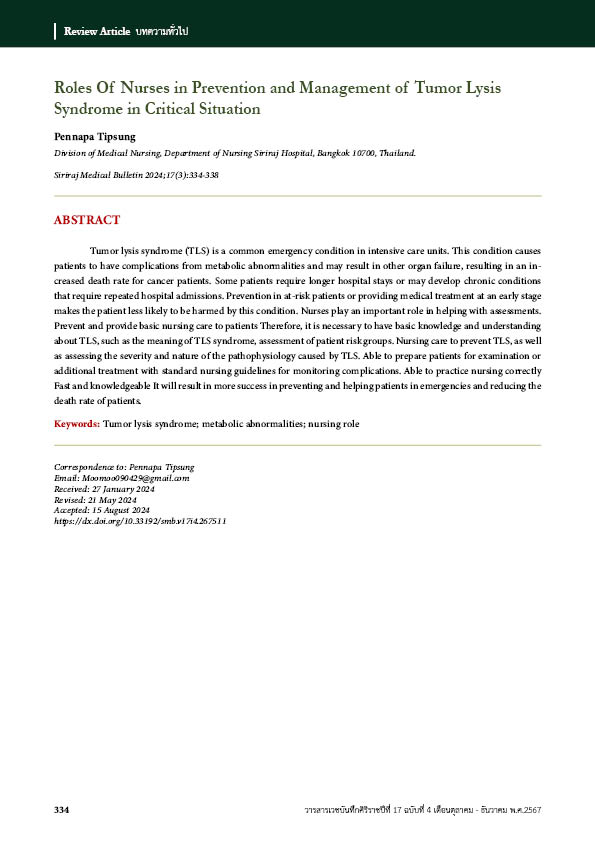Roles Of Nurses in Prevention and Management of Tumor Lysis Syndrome in Critical Situation
Main Article Content
Abstract
Tumor lysis syndrome (TLS) is a common emergency condition in intensive care units. This condition causes patients to have complications from metabolic abnormalities and may result in other organ failure, resulting in an increased death rate for cancer patients. Some patients require longer hospital stays or may develop chronic conditions that require repeated hospital admissions. Prevention in at-risk patients or providing medical treatment at an early stage makes the patient less likely to be harmed by this condition. Nurses play an important role in helping with assessments. Prevent and provide basic nursing care to patients Therefore, it is necessary to have basic knowledge and understanding about TLS, such as the meaning of TLS syndrome, assessment of patient risk groups. Nursing care to prevent TLS, as well as assessing the severity and nature of the pathophysiology caused by TLS. Able to prepare patients for examination or additional treatment with standard nursing guidelines for monitoring complications. Able to practice nursing correctly Fast and knowledgeable It will result in more success in preventing and helping patients in emergencies and reducing the death rate of patients.
Article Details

This work is licensed under a Creative Commons Attribution-NonCommercial-NoDerivatives 4.0 International License.
References
Rahmani B, Patel S, Seyam O, Gandhi J, Reid I, Smith N, Khan SA. Current understanding of tumor lysis syndrome. Hematol Oncol. 2019;37(5):537-547.
Webster JS, Kaplow R. Tumor Lysis Syndrome: Implications for Oncology Nursing Practice. Semin Oncol Nurs. 2021;37(2):151136.
Barbar T, Jaffer Sathick I. Tumor Lysis Syndrome. Adv Chronic Kidney Dis. 2021;28(5):438-446.e1.
Arnaud M, Loiselle M, Vaganay C, Pons S, Letavernier E, Demonchy J, Fodil S, Nouacer M, Placier S, Frère P, Arrii E, Lion J, Mooney N, Itzykson R, Djediat C, Puissant A, Zafrani L. Tumor Lysis Syndrome and AKI: Beyond Crystal Mechanisms. J Am Soc Nephrol. 2022;33(6):1154-1171.
Matuszkiewicz-Rowinska J, Malyszko J. Prevention and Treatment of Tumor Lysis Syndrome in the Era of Onco-Nephrology Progress. Kidney Blood Press Res. 2020;45(5):645-660
Chaitman M, Dixit D. and Bridgeman MB. Potassium-Binding Agents for the Clinical Management of Hyperkalemia. Pharmacy and Therapeutics 2016;41(1):43–50.
Chaitman M, Dixit D. and Bridgeman MB. Potassium-Binding Agents for the Clinical Management of Hyperkalemia. Pharmacy and Therapeutics 2016;41(1):43–50.
Wang Y, Luj, Tao Y. Impact of daytime continuous veno-venous haemofiltration on treatment of paediatric tumour lysis syndrome. J Int Med Res.2018;46(9):3613-20.






